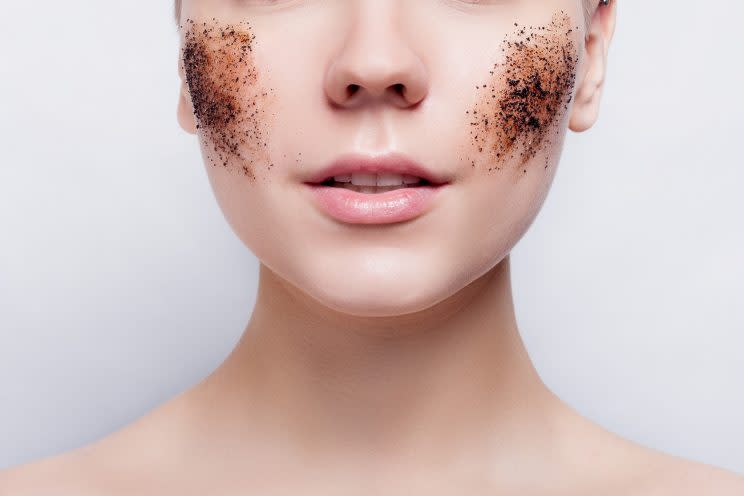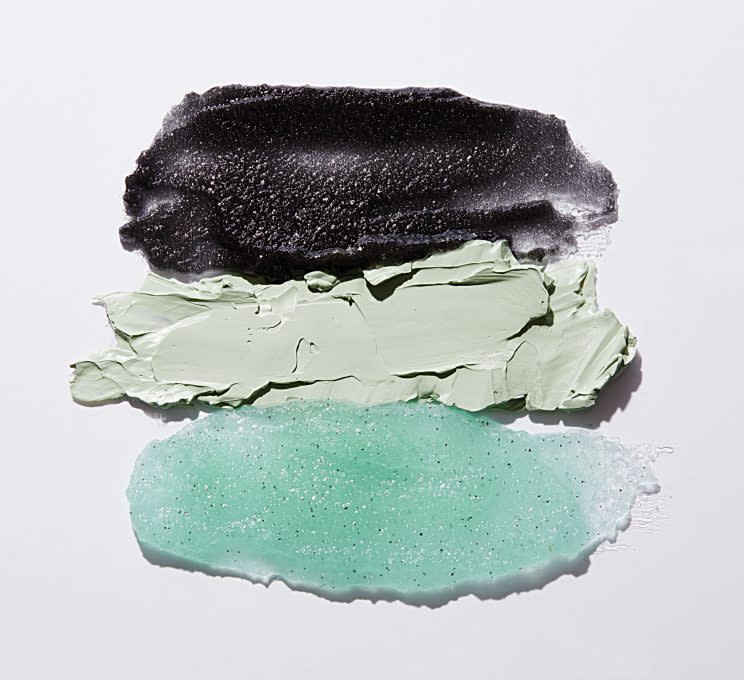Is exfoliation doing more damage than good? We ask the experts

Perhaps it’s the grey weather outside but is your skin still looking a bit sluggish and dull? We knew our skin needed some recovery from the festive hangover but if it’s STILL looking dull and tired despite your new healthy diet (full of skin-loving leafy greens obvs), it might be in need of a bit of exfoliation.
When we think of skin exfoliation, you might think loofahs, salt scrubs and apricot kernels but the best ways to exfoliate will actually depend on your skincare concern and skin type. For example, flaky, dry skin has a completely different renewal method compared to sensitive or oily skin.
Exfoliating too regularly, or too harshly can actually be bad for your skin but how much is too much? We spoke to some skincare experts to get the complete lowdown on how to exfoliate properly and reap the benefits, without damaging your skin.
![A loofah isn’t the only option for exfoliating [Photo: Getty]](https://s.yimg.com/ny/api/res/1.2/3ySgIIyZRg72kwIpFTqTmA--/YXBwaWQ9aGlnaGxhbmRlcjt3PTk2MDtoPTExOTA-/https://media.zenfs.com/en/homerun/feed_manager_auto_publish_494/13879257f92f2e019c538cc76847bb6b)
Why do we need to exfoliate?
Just like your ‘new year, new me’ resolutions, sometimes revealing your new, radiant skin needs a helping hand. Lisa Pejovnik from Sukin, Australia’s favourite natural beauty brand, says “During winter, the harsh drying effect of cold weather can result in excess dead skin cells. Gentle exfoliation will rid you of these skin cells, which can linger on the surface of skin, leaving skin looking dull and dry. To maintain a healthy, radiant complexion during the cold winter months, it is essential to exfoliate.
While it is tempting to slather on deeply moisturising creams to smooth your skin, it is first vital to remove the dead skin cells completely, then maintain the smooth, radiant skin that’s revealed underneath.”
![Exfoliating too hard to often will damage skin [Photo: Getty]](https://s.yimg.com/ny/api/res/1.2/SSRUwVnMZtWjFKKhgo454A--/YXBwaWQ9aGlnaGxhbmRlcjt3PTk2MDtoPTY0MA--/https://media.zenfs.com/en/homerun/feed_manager_auto_publish_494/87a356d4c3922d0e0769c6fb5e9b6d97)
Are there other benefits of exfoliation?
Lisa Franklin, skincare expert and facialist says, “As well as removing dead skin cells and brightening the complexion, exfoliating is a great way to open the pores and rid them of all the excess dirt and oils that your cleanser may not catch.
As you are stimulating the skin, exfoliating also encourages blood circulation and promotes healthy skin cell turnover. This can improve your skin elasticity, which is crucial to prolong a youthful appearance.”
There are several ways to exfoliate your skin, each with varying levels of power and purpose. Those with sensitive or acne-prone skin should look to a natural scrub to gently but effectively rid their complexion of dead skin cells, since harsh chemicals found in abrasive scrubs or chemical exfoliators can irritate the skin further.

Powder exfoliators
These water-activated powder formulations help to avoid overdoing it as they don’t contain large exfoliating grains. They tend to use rice proteins and enzymes to help renew the very top level of your skin, for an instant brightening effect.

We love the Indeed Exfoliating Powder £18.99 which uses a unique combination of bamboo extract, rice bran protein, pineapple enzymes and Oknawa red algae to remove dead skin cells, unclog pores and promote cell renewal. The powder disappears into a foam which is a delight to massage across the face and neck.
Acid based exfoliators
Some exfoliators using fruit acids or AHAs like glycolic or lactic acid (for more info read “Should we be using Acids on our skin” here) These often take the form of a lotion or a leave-on mask and work by dissolving skin cells on the surface of the skin.

Try the Nip & Fab Glycolic Fix Exfoliating Facial Pads £12.99, which are easy-to-use pads that are saturated in a glycolic and hyaluronic acid mix, with soothing blue daisy and witchhazel. Just apply to the face like you would your toner and give a few minutes to sink in before applying your next product.
Mechanical grain exfoliators
These are the classic gels and creams, packed full of teeny scrubby bits like jojoba beads and ground walnut shell. Many like the feeling of scrubbing your skin clean but there is a higher risk of damaging your skin by scrubbing too hard and scratching your face. The larger the grain, the harsher it is on the skin – look for scrubs with finer grains.

Sukin’s Oil Balancing + Charcoal Pore Refining Facial Scrub £9.99 harnesses the effects of charcoal to draw impurities from the skin. Sukin use only natural ingredients in their microbead-free exfoliators, which are gentler than chemical scrubs – this also makes them suitable for everyday use.
The key exfoliating tips from Lisa Franklin
The skin is more vulnerable after exfoliating so, to maintain your skin’s natural barrier, make sure you follow up with a good protective moisturiser and always use SPF to ensure an even skin tone.
For sensitive skin try to select products which use natural ingredients, as these are less likely to irritate the skin.
Make sure you are not over exfoliating – either too frequently or too harshly – and always ensure you listen to what your body is telling you. If you are experiencing redness or inflammation reduce how often you exfoliate or consider switching products.
I would recommend exfoliating once a week, to help the skin breathe properly and maintain a smooth, even skin.
Is exfoliation a regular part of your skincare routine? Are you guilty of scrubbing a bit too hard? Tweet us your thoughts @YahooStyleUK.
21 beauty products suitable for vegans
Jennifer Lawrence’s best beauty moments of all time


